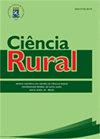2007年至2017年,巴西马兰赫州的历史亮点
IF 0.9
4区 农林科学
Q3 AGRONOMY
引用次数: 0
摘要
摘要:马蹄疫是由马蹄疫伯克霍尔德菌引起的一种马蹄疫传染病,该菌是一种兼性细胞内非移动革兰氏阴性菌,可传播给其他动物和人类。本研究描述了2007年至2017年在巴西东北部亚马逊-塞拉多过渡地区的马拉尼赫本文章由计算机程序翻译,如有差异,请以英文原文为准。
Historical highlights regarding glanders, from 2007 to 2017, in the state of Maranhão, Brazil
ABSTRACT: Glanders is an infectious disease of equids caused by Burkholderia mallei, a facultative intracellular non-mobile Gram-negative bacterium that can be transmitted to other animals and humans. This study described glanders cases reported in the state of Maranhão, located within an Amazon-Cerrado transition region in northeastern Brazil, from 2007 to 2017. A database in an electronic spreadsheet (Microsoft Excel 2010) was developed containing information on the number of positive animals according to age, sex, purpose, year and month, municipality and mesoregion of origin of the animal. The descriptive analyzis was performed on data provided by the State Agency for Agricultural and Livestock Protection of the state of Maranhão (AGED), and by the official private laboratory. As the database did not have information data about negative animals, possible risk factors could not be evaluated. Among the total of 62,555 equids were evaluated by means of the complement fixation test (CFT), 59,036 were horses, 2,981 mules and 538 donkeys. Thirty-five samples (0.06%) reacted in the CFT. Five additional samples were by the western blot technique and three of them were positive. All the reactive horses (Equuscaballus) were from rural areas. Results presented here indicate that glanders may be endemic in the state of Maranhão and is a public health concern.
求助全文
通过发布文献求助,成功后即可免费获取论文全文。
去求助
来源期刊

Ciencia Rural
AGRONOMY-
CiteScore
1.70
自引率
0.00%
发文量
233
审稿时长
2-4 weeks
期刊介绍:
The purpose of Ciência Rural is to publish the results of original research, note and reviews which contribute significantly to knowledge in Agricultural Sciences. Preference will be given to original articles that develop news concepts or experimental approaches and are not merely repositories of scientific data. The decison of acceptance for publication lies with the Editors and is based on the recommendations of Editorial Comission, Area Committee and/ or ad hoc reviewers. The editors and reviewers are external to the institution.
 求助内容:
求助内容: 应助结果提醒方式:
应助结果提醒方式:


